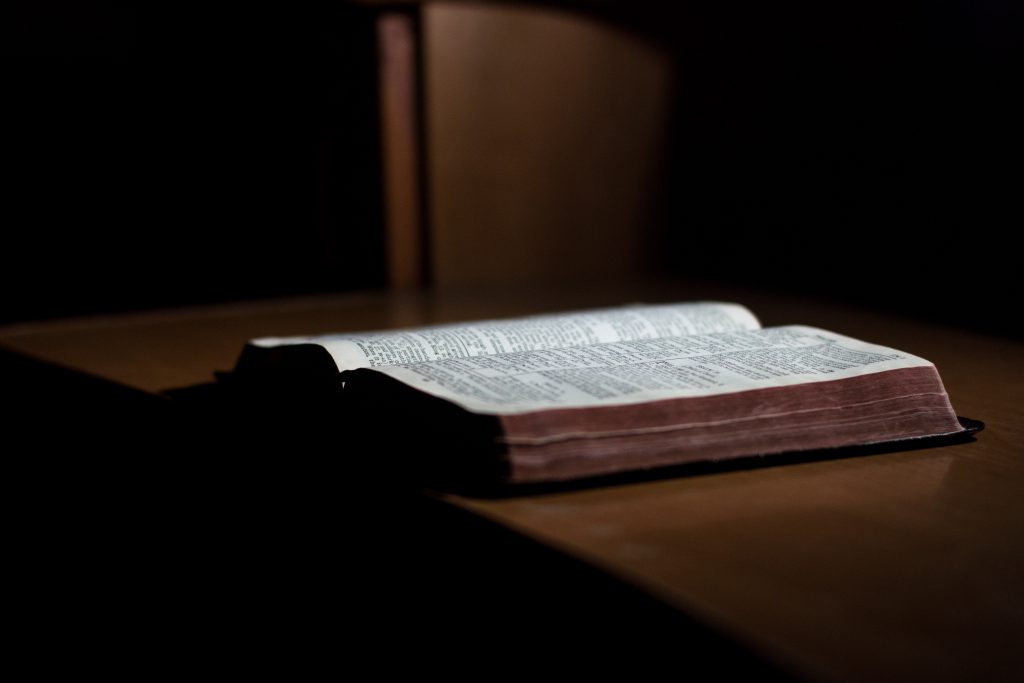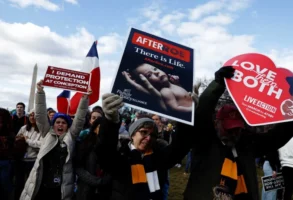
Published October 8, 2020
Since it became public that Donald Trump was considering nominating Judge Amy Coney Barrett to the Supreme Court, filling the vacant seat left by the death of Justice Ruth Bader Ginsburg, a great deal of negative media attention has focused on Barrett’s Catholic faith.
Some pundits, for instance, have insinuated not only that Barrett will overturn the 1973 Supreme Court decision in Roe v. Wade — which legalized abortion on demand throughout all nine months of pregnancy — but also that, if she votes to do so, it will be because she’s seeking to impose her religious views on the entire country.
We’ve also seen a series of articles, most of which were deeply underreported or factually inaccurate, suggesting that Barrett’s purported involvement in the lay organization People of Praise is disqualifying evidence of her “ultraconservative” sympathies.
As this anti-Catholic commentary continued over the course of the week leading up to the formal announcement of her nomination, some on the left attempted to reframe the narrative, suggesting either that no one prominent had been maligning Barrett about her religion or that it is entirely appropriate to ask whether a faithful Catholic is capable of serving as an impartial judge.
When conservatives pointed out that this rhetoric about Catholicism was ignorant and often bigoted, progressives gestured at Democratic presidential nominee Joe Biden, Supreme Court justice Sonia Sotomayor, and House speaker Nancy Pelosi, insisting that, because these leading liberals are Catholic, it is impossible to accuse anyone on the left of being anti-Catholic.
But, of course, the distinction is obvious: All three of those leaders, along with nearly all the Catholic politicians in the Democratic Party, have abandoned Church teaching on the dignity and value of every human life, including the dignity and value of children in the womb. Barrett is a problem and Biden is not because, as far as progressives are concerned, she’s the kind of Catholic who actually believes what Catholics are called to believe about the intentional destruction of innocent human life. That’s the kind of Catholic they can’t abide.
Their reasoning aside, it is ludicrous for anyone to argue that no prominent Democrats have made religious faith a key part of their opposition to judicial nominees over the past few years. In fact, Barrett herself was subject to some of the most egregious examples of this during her 2017 confirmation hearing, after Trump nominated her to the Seventh Circuit Court of Appeals.
“When you read your speeches, the conclusion one draws is that the dogma lives loudly within you,” Senator Dianne Feinstein (D., Calif.) said during the hearing, referring to Barrett’s Catholic faith. “And that’s of concern when you come to big issues that large numbers of people have fought for, for years in this country.”
Feinstein was alluding to Roe, which the senator supports so dogmatically that she insists on referring to it as a “super-precedent.”
During the same hearing, Democratic senator Dick Durbin, himself a Catholic, criticized Barrett’s use of the phrase “orthodox Catholic,” saying that it is unfair to Catholics who do not agree with Church teaching on abortion. “Do you consider yourself an orthodox Catholic?” Durbin asked.
Both Senator Mazie Hirono (D., Hawaii) and Senator Shelden Whitehouse (D., R.I.) went on to ask Barrett about her previous writing, each suggesting that her Catholicism was an obstacle to maintaining impartiality as a judge.
Barrett was far from the last nominee to face questions such as these. Brian Buescher, for instance, nominated to be a federal district judge in Nebraska, was subjected to questions about his membership in the Knights of Columbus, a Catholic fraternal organization that has existed for more than a century and that has 2 million members who conduct charitable work.
Both Hirono and Senator Kamala Harris, now Biden’s running mate, used their questions to Buescher to insinuate that his membership in the Knights disqualified him from serving on the bench.
Here’s how Harris put it to Buescher in a series of questions she posed:
Since 1993, you have been a member of the Knights of Columbus, an all-male society comprised primarily of Catholic men. In 2016, Carl Anderson, leader of the Knights of Columbus, described abortion as “a legal regime that has resulted in more than 40 million deaths.” Mr. Anderson went on to say that “abortion is the killing of the innocent on a massive scale.” Were you aware that the Knights of Columbus opposed a woman’s right to choose when you joined the organization? . . . Were you aware that the Knights of Columbus opposed marriage equality when you joined the organization? . . . Have you ever, in any way, assisted with or contributed to advocacy against women’s reproductive rights?
Hirono, never one to beat around the bush, asked Buescher whether he intended to “end” his “membership with this organization to avoid any appearance of bias,” suggesting that she’d withhold her vote at least until he had left the Knights.
Both Harris and Hirono posed similar questions to another Catholic nominee, Paul Matey, nominated to the Third Circuit Court of Appeals, about his membership in the Knights, asking him in numerous written questions whether he personally agrees with the Catholic beliefs promoted by the organization.
Harris repeated this line of questioning when yet another Catholic, Peter Phipps, was nominated to the Third Circuit. She noted that the Knights of Columbus state that they defend the right to life of every human being, from the moment of conception to natural death, and then asked Phipps, “As a member of this organization, do you carry out this mission?”
Jonathan Allen Kobes, a Reformed Protestant nominated to in 2018 serve on the Eighth District Court of Appeals, faced questions from Harris about his connections with a Michigan nonprofit that helped couples with adoption, foster care, and crisis pregnancies. “Were you aware that Bethany Christian Services discriminated against LGBTQ couples who sought to adopt children?” Harris asked.
After being nominated to the Fourth Circuit Court of Appeals, Allison Jones Rushing, a Baptist, faced several questions about her religious beliefs, including from Vermont’s Democratic senator Patrick Leahy, who asked whether she believes “that marriage equality represents a threat to the ‘foundation of society,’ and risks ‘needless emotional and material hardships’ for ‘women, children, and the underprivileged’?”
Whitehouse asked Rushing whether she believes that “Judeo-Christian morality and homosexuality [are] incompatible,” and Connecticut Democrat Richard Blumenthal inquired whether the nominee would “perform a same-sex wedding if asked to do so.”
These are just a few of the kinds of questions that Democratic senators on the Judiciary Committee have posed to religious nominees whom they believe, for whatever reason, are insufficiently committed to progressive dogma. When scrutinizing a nominee, it’s perfectly acceptable to ask about their judicial philosophy; it is unacceptable to ask whether belonging one particular faith tradition or another renders a nominee incapable of serving as a judge.
Democrats shouldn’t stoop to this level again with Barrett, and they shouldn’t get away with pretending they’ve never done it before.
Alexandra DeSanctis is a staff writer for National Review and a visiting fellow at the Ethics and Public Policy Center. @xan_desanctis





